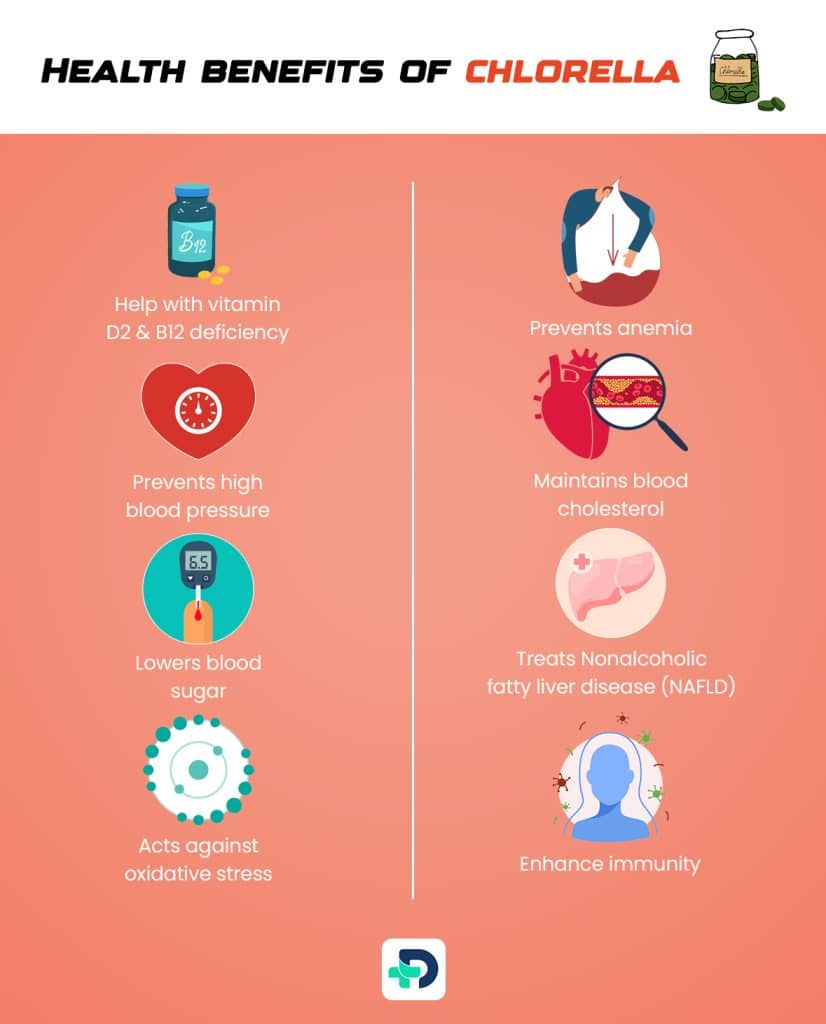Benefits of Chlorella

- Chlorella
- 16 Aug 2023
Overview
What is chlorella?
Chlorella is high in nutrients and is a single-cell algae that has recently gained popularity due to its health advantages. Chlorella takes its name from the Greek word chloros (green) and the Latin word ella (little). It originates from Japan and Taiwan. Because of its excellent nutritional profile, some people refer to Chlorella as a superfood. This article highlights Chlorella’s health advantages, nutritional value, adverse effects, risks, and interactions with other drugs.

Key Facts
- Dr. Martinus Willem Beijerinck, a well-known microbiologist and botanist, first mentioned Chlorella vulgaris in 1890. 1Overview| Researched based study from Nlm.nih.gov
- Chlorella is a genus of around 13 species of green algae.
- Their cell wall is rigid, leaving them harder to digest if not processed.1Overview| Researched based study from Nlm.nih.gov
- The FDA has declared Chlorella “generally recognized as safe” 2Overview| Researched based study from Fda.gov .
- They are commercially grown for food and as a supplement for its various compounds.
- Chlorella vulgaris and Chlorella pyrenoidosa are grown as commercially available sources for dietary supplements using large-scale farming methods.
Nutritional value
What nutrients are in chlorella?
Chlorella has multiple valuable components, which may include the following:
Macronutrients
- Protein – includes a high concentration of protein, roughly 59 percent dry weight, which is more than soybeans, which have around 33 percent dry weight.1Nutritional value| Researched based study from Nlm.nih.gov ,3Nutritional value| Researched based study from Nlm.nih.gov )
- Amino acids – like all essential amino acids for humans, including leucine, isoleucine, lysine, phenylalanine, methionine, threonine, valine, tryptophan, and histidine are present in these products.
- Fiber – chlorella, when consumed in large quantities, can be a rich source of fiber.
- Fats include linolenic acid and linoleic acid, but not arachidonic acid, eicosapentaenoic acid, or docosahexaenoic acid.
Micronutrients
Vitamins
Chlorella products include all of the vitamins that humans require 1Nutritional value| Researched based study from Nlm.nih.gov
- Vitamin B1
- Vitamin B12
- Vitamin 6
- Vitamin B2
- Folate
- Biotin
- Niacin
- Pantothenic acid
- Vitamin D2
- Vitamin C
- Vitamin E
- Vitamin K
- α- and β-carotenes.
Minerals
- Iron
- Potassium
- Copper
- Magnesium
- Calcium
- Zinc
Other antioxidants
- Chlorophyll
- Lycopene
- Lutein
Dosage
Recommended dosage of chlorella
- Chlorella comes in capsules, pellets, tablets, capsules, powder, and extract.4Dosage| Researched based study from Vitaminexpress.org
- There are no universal recommendations for chlorella microalgae dosage.
- The recommended intake of most supplements is 2-3 grams.
- Adults have typically taken 3-10 grams of Chlorella orally daily for 2-3 months.
- Start with a lower dose of Chlorella each day and progressively raise the dosage once you handle it well.
- Individual dosage may vary, therefore visit a physician to find the appropriate dosage for you.
Health benefits

Health benefits of chlorella
Chlorella is said to have the following health benefits
Help with vitamin D2 and B12 deficiency
- Chlorella products include significant quantities of vitamins D2 and B12 and may be helpful for vegetarians who are deficient in these vitamins.1Health benefits| Researched based study from Nlm.nih.gov
Prevents anemia
- Chlorella products include high levels of iron, vitamin B12, and folate, which minimizes the risk of anemia even in pregnant women.5Health benefits| Researched based study from Springer.com
Prevents high blood pressure
- Their high potassium level helps people avoid hypertension. Furthermore, GABA-rich chlorella dramatically reduced high blood pressure in humans 6Health benefits| Researched based study from Nlm.nih.gov
Maintains blood cholesterol
- As Chlorella contains carotenoids, fiber, niacin, and other antioxidants, it may help decrease blood cholesterol in persons who have a mild cholesterol level increase.7Health benefits| Researched based study from Nlm.nih.gov
Lowers blood sugar
- Chlorella can control blood sugar levels.8Health benefits| Researched based study from Nlm.nih.gov
Treats Nonalcoholic fatty liver disease (NAFLD)
- As Chlorella could improve an individual’s blood sugar and lipid profile, they could be used as a supplemental treatment for NAFLD 9Health benefits| Researched based study from Nlm.nih.gov
Acts against oxidative stress
- The antioxidant properties of Chlorella can protect people against oxidative stress and help prevent chronic diseases such as heart disease, cancer, and chronic obstructive pulmonary disease8Health benefits| Researched based study from Nlm.nih.gov
Detoxification of the body
- In different studies, chlorella supplementation has been proven to detoxify the body from hazardous pollutants like dioxin 10Health benefits| Researched based study from Nlm.nih.gov and other heavy metals like mercury, tin, silver, and lead levels in individuals.11Health benefits| Researched based study from Nlm.nih.gov
Enhance immunity
- In several trials, short-term chlorella supplementation has shown a rise in various immune markers in the body 12Health benefits| Researched based study from Nlm.nih.gov and saliva13Health benefits| Researched based study from Nlm.nih.gov
May improve training endurance
- People who took chlorella supplements had a higher maximum oxygen intake, indicating that Chlorella may assist in enhancing endurance during aerobic exercise capacity14Health benefits| Researched based study from Nlm.nih.gov
May prevent cancer
- Chlorella has been shown to have specific qualities that can help prevent cancers such as human colon cancer 15Health benefits| Researched based study from Nlm.nih.gov However, more research is required.
Side effects
Does chlorella have any side effects ?
It is generally safe, but few common side effects of Chlorella may include:
- Nausea.
- Gas.
- Diarrhea.
- Green stools.
- Stomach cramping.
- Sensitivity to sunlight.
Precautions
Precautions
- People taking chlorella supplements should wear sunscreen while going outdoors as they can make the skin more sensitive to sunlight.
- Breastfeeding mothers – should avoid using it as there is insufficient credible information to determine whether Chlorella is safe to use while breastfeeding.
- People allergic to mold should be cautious as they could get an allergic reaction to Chlorella.
- People allergic to iodine should stay away from Chlorella as it may contain iodine.
- People with a weaker immune system should stay away from the product as it may promote the growth of unwanted bacteria in the intestines.
- Remember that chlorella products can differ based on how the Chlorella was grown, collected, and processed.
- Always look for a quality assurance seal when buying a chlorella supplement to ensure safety.
Interactions
Interactions
The following medications may interact with Chlorella:
Warfarin
- Chlorella includes a significant amount of vitamin K, which the body uses for blood clotting. Warfarin is a drug given to prevent blood from clotting. When taken together, Chlorella may reduce the effects of warfarin16Interactions| Researched based study from Nlm.nih.gov
Photosensitizing drugs
- Chlorella may increase skin sensitivity to sunlight. When combined with other photosensitive, it may increase the risk of blistering, sunburn, or rashes when exposed to sunlight17Interactions| Researched based study from Nlm.nih.gov
Bottom line
The bottom line
Although Chlorella is an excellent source of antioxidants, vitamins, and minerals, it is essential to check with a doctor before using it as a dietary supplement for any health concerns. Also, an individual must inform the doctor about their medications, including prescription and non-prescription drugs, as taking them together may produce unwanted effects. Although some researchers suggest it can improve health and well-being, more human studies are required to support these claims.
Any feedback on this article?
 This Articles content was accurate
This Articles content was accurate Very Informative Article
Very Informative Article I have a question or a comment
I have a question or a comment
 This article contains inaccurate content
This article contains inaccurate content This article was not helpful
This article was not helpful I have a question or a comment
I have a question or a comment
We appreciate your helpful feedback!
Checkout our social pages
References
-
National Library of Medicine
Potential of Chlorella as a Dietary Supplement to Promote Human Health | Overview | Nutritional values | Health benefits
-
U.S. Food and Drug Administration
GENERALLY RECOGNIZED AS SAFE DETERMINATION FOR CHLORELLA POWDER IN SELECTED CONVENTIONAL FOODS | Overview
-
National Library of Medicine
Algae as nutritional and functional food sources: revisiting our understanding | Nutritional values
-
Vitamin Express
Chlorella | Dosage
-
Springer Link
Chlorella pyrenoidosa Supplementation Reduces the Risk of Anemia, Proteinuria and Edema in Pregnant Women | Health benefits
-
National Library of Medicine
Anti-hypertensive effect of gamma-aminobutyric acid (GABA)-rich Chlorella on high-normal blood pressure and borderline hypertension in placebo-controlled double blind study | Health benefits
-
National Library of Medicine
Impact of daily Chlorella consumption on serum lipid and carotenoid profiles in mildly hypercholesterolemic adults: a double-blinded, randomized, placebo-controlled study | Health benefits
-
National Library of Medicine
A Multifunctional Dietary Supplement with Diverse Medicinal Properties | Health benefits
-
National Library of Medicine
The Effect of Chlorella vulgaris Supplementation on Liver En-zymes, Serum Glucose and Lipid Profile in Patients with Non-Alcoholic Fatty Liver Disease | Health benefits
-
National Library of Medicine
Chlorella (Chlorella pyrenoidosa) supplementation decreases dioxin and increases immunoglobulin a concentrations in breast milk | Health benefits
-
National Library of Medicine
The Long-Term Algae Extract (Chlorella and Fucus sp) and Aminosulphurate Supplementation Modulate SOD-1 Activity and Decrease Heavy Metals (Hg++, Sn) Levels in Patients with Long-Term Dental Titanium Implants and Amalgam Fillings Restorations. Antioxidants (Basel) | Health benefits
-
National Library of Medicine
Beneficial immunostimulatory effect of short-term Chlorella supplementation: enhancement of natural killer cell activity and early inflammatory response | Health benefits
-
National Library of Medicine
Salivary secretory immunoglobulin A secretion increases after 4-weeks ingestion of chlorella-derived multicomponent supplement in humans: a randomized cross over study | Health benefits
-
National Library of Medicine
Chlorella-derived multicomponent supplementation increases aerobic endurance capacity in young individuals. | Health benefits
-
National Library of Medicine
Marine bioactives as functional food ingredients: potential to reduce the incidence of chronic diseases. | Health benefits
-
National Library of Medicine
Warfarin therapy and chlorella | Interactions
-
National Library of Medicine
Chlorella photosensitization. New phytophotodermatosis | Interactions






































